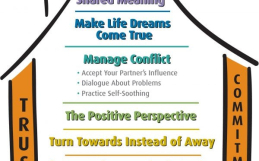Breaking the Cycle of Defensiveness in Relationships
Defensiveness is one of the “Four Horsemen” in relationships, according to the research of Drs. John and Julie Gottman. The Four Horsemen are communication patterns that predict a relationship’s failure or success. These patterns include criticism, contempt, defensiveness, and stonewalling. This post will focus on defensiveness and how it can be a significant roadblock in maintaining healthy and fulfilling relationships.
Defensiveness is a natural and expected response when we feel criticised or attacked by our partner. It’s a way of protecting ourselves from the perceived threat and defending our position. It is important to add that individuals can also get defensiveness in the absence of criticism. Unfortunately, regardless of why someone gets defensive, this pattern in couples’ communication can quickly escalate into arguments. Because when we are defensive, we reject, ignore, or counterattack the feedback we receive from our partners. This reaction can manifest in many ways, such as becoming argumentative, denying responsibility, blaming your partner, or making excuses. This, overtime can cause significant harm to the relationship, undermining trust and intimacy and leading to feelings of loneliness.
Drs. John and Julie Gottman believe that the antidote to criticism is accepting responsibility. They believe couples in healthy relationships do not get defensive when their partner raises something as an issue; they are happy to take responsibility for their contribution, even small, to the conflicts in the relationship.
I believe accepting responsibility is very important but might not be enough for some couples to tackle defensiveness in their relationship.
Here are four suggestions that have helped my clients to manage defensiveness:
- Find the source of defensiveness: Defensiveness can stem from feelings of insecurity, fear of rejection, or the need to protect our self-esteem. When we understand why we become defensive, we can find more productive ways of responding to our partner’s feedback.
- Develop empathy: Empathy involves understanding or trying to, our partner’s perspective and feelings. When we understand their perspective, it’s easier to see that their feedback is not necessarily a criticism of us but rather their experience of reality or request for change.
- Practice active listening: When our partner gives us feedback, we need to listen to what they have to say without becoming defensive. This means focusing on their words and avoiding interpretation, assumptions and interruptions. It also involves asking questions to clarify their perspective. Active listening can help to build trust and understanding in the relationship.
- Communicate openly and respectfully without Criticism. We need to communicate in a non-judgmental and non-threatening, it creates a safe environment for both partners to express themselves. By expressing our feelings, needs, and wants clearly and respectfully, we can work together to find solutions for both of us.
If you believe you or your partner struggle with defensiveness in the relationship, please feel free to seek the support of a couple therapist who is familiar with Gottman method. They are able to support you in identifying and managing the patterns of defensiveness in your relationship.
I wish you all the best.




